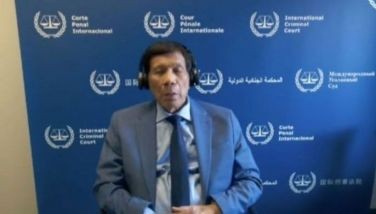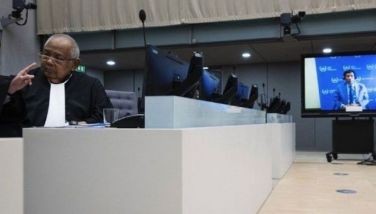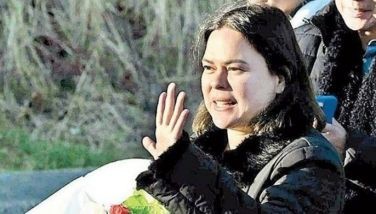Who is the bigger offender?

Constitutional reform advocates have come to a truce with those who are against any change in the 1987 Constitution. Instead of going for more extensive restructuring of government like a shift to parliamentary federal system, most of them are amenable to limiting the change to the economic provisions of the Constitution.
These provisions have discouraged direct foreign investments from coming here. They would rather go to other countries with less stringent laws. Malaysia, Indonesia, Thailand and even Vietnam have received more direct foreign investments than the Philippines. They have more liberal rules. Indeed, they actively seek direct foreign investments as a tool of development. So it should not be surprising if they should leave the Philippines behind as the least attractive country for investments in the region. The logic is stark. With more foreign direct investments in these countries they have more funds to provide jobs and build better infrastructure than the Philippines. These also bring science and technology in their quest for successful investments. We miss all of these because we have a hostile climate for direct foreign investments. And there are many examples of foreign-owned companies that have come to grief and gone ahead thinking they can overcome difficulties.
What we have plenty of are poor people, dirty slums, polluted rivers and uncollected garbage among other things. Our people are unable to find jobs here so they take up menial jobs abroad after the government has spent for their education only to benefit other countries. The list of woes of our overseas workers is long - broken families, abusive employers, etc. etc. and we think of sending Filipinos abroad to work is a blessing.
The situation is becoming desperate that some Congressional leaders like the Senate president and the House Speaker seek a way out of the problem. Senate President Juan Ponce Enrile Jr. and House Speaker Feliciano Belmonte should be supported for taking the initiative to break this vicious cycle that is one of the main reasons for our poverty and being the laggard of the region. Reformists should take the cue from the Enrile-Belmonte bill.
What are the chances for this to be finally passed? During one of the Ramos series of lectures before a big audience, Enrile was asked on when he thought the bill will be passed, he said confidently “before the end of the year.” It is good he has put a time frame in which Congress will work. He was clear however that it is not constitutional reform but changing our investment laws through a “legislative process.” Father Joaquin Bernas calls it a “surgical cha-cha”. The Enrile-Belmonte bill is addressing the issue of poverty immediately rather than it be lost in a protracted debate on what ought and what ought not to be changed in the Constitution.
I would go along with that and so should many others who want reforms. We need it as soon as possible. Those who will not support the bill and think the poor can wait are to me the greater offenders, even more than self-serving moralists. We cannot quantify just what the country has lost in postponing this task and making victims of the poor. I do not believe family break up, hunger, sickness, lack of schools and hospitals can wait. What is government for if it cannot alleviate poverty?
The country has been held captive by the 1987 Constitution for far too long. It is an anti-people Constitution. It has hurt the Philippines, making it impossible to move forward economically or politically.
We will have to confront the issue that it is not helping us with many areas of the economy reserved for Filipinos who lack the capital and the technology in the herculean task of nation building in step with the region’s phenomenal progress. Modernizing the economy will require at least $5 billion in annual foreign direct investments. We don’t get that.
According to an article in AsiaBizNews, in a good year, FDI ranges between $2 billion and $3 billion. The year 2010 was exceptional. $7.85 billion in FDI was recorded, a record, and most of that came during the first half, and into guess what — beer.
“Wage earners shoulder up to 98 percent of total individual income tax collection. The very rich contribute just 2 percent. Only 100 families control the politics and business of this country,” Biznews adds.
“A World Bank study of 87 countries on investing across borders showed the Philippines imposed foreign equity ownership restrictions in more sectors than other countries.
The study also noted that it takes more than 17 to 80 days to establish the foreign-owned limited liability company in Manila, much slower than the average for East Asia and the Pacific.” it adds.
* * *
I have just been sent tickets by my cousin Lolita Adea to a film on the Spanish Civil War entitled “There be Dragons.” According to the review of the film it is an epic tale of revolutionaries and saints in a time of civil war. It is a story of love, heroism, jealousy, hatred and violence and a heartbreaking drama about the power of forgiveness to break the chains of the past .
“There be Dragons” is written and directed by two-time Academy Award-nominee Roland Joffe (The Mission, The Killing Fields, City of Joy) and stars Charlie Cox (Stardust, Casanova), Wes Bentley (American Beauty, Ghost Rider), Olga Kurylenko (Quantum of Solace, Max Payne), Emmy Award-winning actor Derek Jacobi (Gladiator, The Golden Compass), Dougray Scott (Mission Impossible II, Ever After) and Rodrigo Santoro (300, Che).
The film tells the story of London-based investigative journalist Robert Torres (Dougray Scott), who visits Spain to research a book about Josemaría Escrivá (Charlie Cox), the controversial founder of Opus Dei. But, Robert hits a wall, both professionally and personally, when his most promising source — his own father, Manolo Torres (Wes Bentley) turns out to be his least cooperative one. Robert begins to unearth his father’s toxic secrets when he learns that Manolo was not only born in the same Spanish town as Josemaría, but, that they were childhood friends and attended the same seminary. The two men take radically different paths in life, with Josemaría dedicating his life to his faith while Manolo is swept into the brutal and tumultuous Spanish Civil War. Manolo descends into a dangerous and jealous obsession when the beautiful Hungarian revolutionary Ildiko (Olga Kurylenko) doesn’t return his affections and instead gives herself to the courageous military leader, Oriol (Rodrigo Santoro).
As Robert continues to unearth the secrets of Josemaría’s life and Manolo’s mysterious anger, their overlapping journeys are revealed with the truths and sorrows of their past choices, which compels Manolo to confront his own secret with one last opportunity of forgiveness.
Academy Award-winner Eugenio Zanetti (Restoration, What Dreams May Come) is the art director, Academy Award-winner Yvonne Blake (What Dreams May Come) is the costume designer, Academy Award-winner Michele Burke (Quest for Fire, Dracula) is the make-up designer and AcademyAward-nominee Richard Nord (The Fugitive) is the editor.
The director of photography is Gabriel Beristain (Caravaggio) and the film’s producers are Ignacio Gomez-Sancha, Roland Joff and Ignacio Nunez.
- Latest
- Trending
























